译林版英语词汇表(四年级下)
(完整版)译林版新版小学英语四年级下册形容词
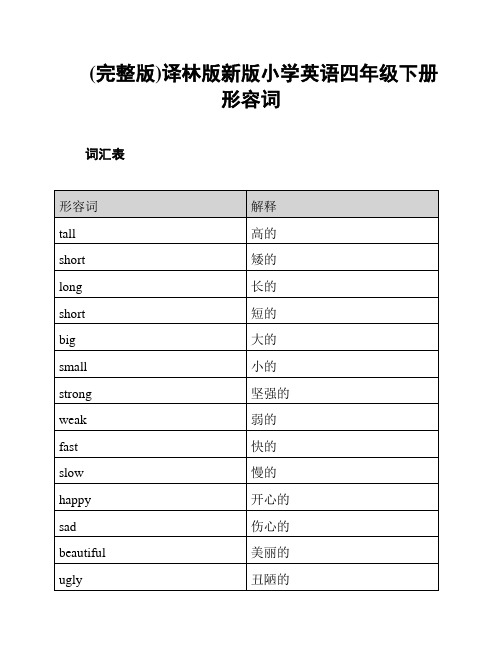
(完整版)译林版新版小学英语四年级下册形容词词汇表用法示例1. The giraffe is tall. (长颈鹿很高。
)2. The pencil is short. (这铅笔很短。
)3. The cake is delicious. (这个蛋糕很好吃。
)4. The dog is dirty. (这只狗很脏。
)5. The flowers are beautiful. (这些花很漂亮。
)6. The car is new. (这辆车是新的。
)7. The boy is clever. (这个男孩很聪明。
)8. The cat is lazy. (这只猫很懒。
)9. The music is noisy. (这音乐很吵。
)10. The room is clean. (这个房间很干净。
)注意事项- 形容词可以用于描述人、动物、物品等的特征或状态。
- 形容词一般位于名词前面,用于修饰名词。
- 形容词的比较级和最高级形式在后面加上-er和-est。
扩展练将以下名词与合适的形容词搭配起来:1. [glasses] The __________ glasses are fashionable. (这副眼镜很时尚。
)2. [fruit] The _______ fruit is sweet. (这些水果很甜。
)3. [mountain] The _______ mountain is tall. (这座山很高。
)4. [soup] The _______ soup is delicious. (这碗汤很好喝。
)5. [child] The _______ child is cute. (这个孩子很可爱。
)参考答案1. fashionable2. sweet3. tall4. delicious5. cute致谢- 课文来源:译林版新版小学英语四年级下册- 单词解释来源:自编。
扬州译林版四年级英语下册第四单元Unit4词汇语法知识点

四年级下册Unit4词汇语法知识点一、单词及词组1.draw some pictures画一些画draw画画,V.动词pictures可数名词like drawing喜欢画画like doing sth.喜欢做某事(一直;习惯性)like to do sth.喜欢去做某事(此时;短暂性)a drawing lesson一节画画课have a swimming lesson上游泳课a V+ing lesson一节…课a dancing lesson一节舞蹈课上课用动词have2.make a cake做一份蛋糕make a salad做一份沙拉3.Have a look.看一看。
Try again.再试一试。
肯定祈使句,动词原形置于句首,让某人做某事。
4.over there那边on the river在河面上on the lake在湖上方位:over there那里,on在…上面5.well done干得好用于夸奖别人做事做得好6.play basketball打篮球play football踢足球球类运用动词play:play table tennis打乒乓球二、发音e发/e/bed,desk,pen,red,ten,Ken,Ben,dress,every,get,lesson,Wednesday,bedroom,elephant,let’s,seven,very,well,welcome三、句型结构1.Let’s draw some pictures here.让我们在这里画画吧。
Let’s do sth.让我们一起做某事2.-What can you see over there?你看那边是什么?/你能看见什么东西在那?-I can see a tree and some flowers.我可以看见一棵树和一些花。
询问别人能看见什么的句型:What can you see…?其对应的回答:I can see…3.Can you see the boat on the river?你能看见在河上的船吗?询问别人是否能看见某样东西:Can you see…?肯/否定回答:Yes,I can./No,I can’t.4.-Can you draw it?你会画吗?-It’s difficult,but I can try.这很难,但我可以试试。
译林英语四年级下的知识点及语法

译林英语四年级下的知识点及语法译林版小学英语四年级下册知识要点Unit1 Our school subjects词汇school subject see Chinese Maths Art Music lesson Monday PE Science fun go to playground afternoon句型What subject do you like? 你喜欢什么科目?I like English. How about you? 我喜欢英语。
那你呢?I like Science. 我喜欢科学。
Welcome back to school. 欢迎回到学校。
What lessons do you have in the afternoon? 你们下午有什么课?Unit2 After school词汇Wednesday Saturday Sunday Tuesday Thursday Friday get up 起床after school 放学后go match today whenevery day每天句型I have…我有……He/She has…他/她有……We don’t have…我们没有……What day is it today? 今天星期几?It’s Monday. 今天星期一。
What a pity! 真遗憾!All right. 好的。
Unit3 My day词汇usually经常go to school 去上学in the morning 在上午in the afternoon 在下午go home 回家homework watch TV 看电视in the evening在晚上have lunch 吃中饭have dinner 吃晚饭go to bed 睡觉at night在夜里句型when do you go to bed? 你什么时间睡觉?I go to bed at nine. 我9点睡觉Unit4 Drawing in the park词汇park draw flower them boat river lakedrawing easy difficult try hill again句型what can you see? 你能看到什么?I can …我能……Good idea! 好主意!Unit5 Seasons词汇seasons spring warm summer hot autumn cool winter coldfly kite放风筝go boating 去划船go swimming 去游泳picnic go climbing 去爬山go skating 去滑冰fine whose句型in spring,it is warm 在春天里,它是暖和的。
译林版四年级下册 Unit6(含中文翻译)

Unit 6 Whose dressis this? 这是谁的连衣裙?Pages 38-39 Story time❶Look at my dress, Su Yang.It's too short.看我的连衣裙,苏洋。
它太短了。
Yes.Try this, Su Hai. 是的。
试试这件,苏海。
OK. 好的。
❷Your trousers are too long, Su Yang.Try these.你的裤子太长了,苏洋。
试试这条。
All right. 好的。
❸Now, let's go to the party.现在,让我们去参加聚会吧。
❹Look at Su Yang's gloves, Helen.看苏洋的手套,海伦。
They're sobig. 它们好大。
❺Whose gloves are these, Su Yang? 这是谁的手套,苏洋? They're my father's. 是我爸爸的。
❻Whose dress is this, Helen?这是谁的连衣裙,海伦?It's my cousin's. 是我表姐的。
It's so beautiful. 它真漂亮。
Thank you. 谢谢你。
单词a coat 一件外套a dress 一件连衣裙a shirt 一件衬衫a sweater 一件毛衣gloves 手套 jeans牛仔裤 shorts 短裤trousers 裤子Page 41 Cartoon time❶What's this? Look! It can move.这是什么?看!它能移动。
❷Is this a ball, Sam?这是一个球吗,萨姆?I think so. 我想是。
Let's play.让我们玩吧。
❸Ouch! 哎哟!What's the matter?怎么了?My hand hurts. 我的手疼。
四年级下册译林版第五单元单词及音标

四年级下册译林版第五单元单词及音标四年级下册译林版第五单元的单词及音标如下:1. bicycle [ˈbaɪsɪkl]自行车2. swing [swɪŋ]秋千3. slide [slaɪd]滑梯4. seesaw [ˈsiːsɔː]跷跷板5. sandpit [ˈsændpɪt]沙坑6. merry-go-round [ˌmɛriɡəˈraʊnd]旋转木马7. kite [kaɪt]风筝8. run [rʌn]跑9. ride [raɪd]骑10. climb [klaɪm]爬11. jump [dʒʌmp]跳12. swim [swɪm]游泳13. skate [skeɪt]滑冰14. roller skate [ˈroʊlər skeɪt]溜冰鞋15. scooter [ˈskutər]滑板车16. skateboard [ˈskeɪtˌbɔːrd]滑板17. Frisbee [ˈfrɪzbiː]飞盘18. ball [bɔːl]球19. hoop [huːp]篮圈20. skipping rope [ˈskɪpɪŋ rop]跳绳21. football [ˈfʊtˌbɔːl]足球22. basketball [ˈbæskətˌbɔːl]篮球23. baseball [ˈbeɪsˌbɔːl]棒球24. volleyball [ˈvɒliˌbɔːl]排球25. badminton [ˈbædmɪntən]羽毛球26. tennis [ˈtɛnɪs]网球27. table tennis [ˈteɪbəl ˈtɛnɪs]乒乓球28. bowling [ˈboʊlɪŋ]保龄球29. gymnastics [dʒɪmˈnæstɪks]体操30. swimming [ˈswɪmɪŋ]游泳这是四年级下册译林版第五单元的词汇表,包含了许多与运动和游戏有关的词汇。
希望这些词汇对您有所帮助!。
译林版小学英语四年级下册知识点汇总
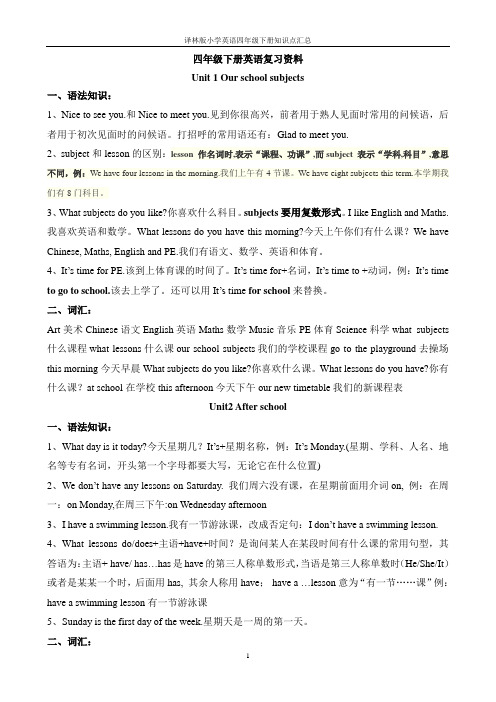
四年级下册英语复习资料Unit 1 Our school subjects一、语法知识:1、Nice to see you.和Nice to meet you.见到你很高兴,前者用于熟人见面时常用的问候语,后者用于初次见面时的问候语。
打招呼的常用语还有:Glad to meet you.2、subject和lesson的区别:lesson 作名词时,表示“课程、功课”,而subject 表示“学科,科目”,意思不同,例:We have four lessons in the morning.我们上午有4节课。
We have eight subjects this term.本学期我们有8门科目。
3、What subjects do you like?你喜欢什么科目。
subjects要用复数形式。
I like English and Maths.我喜欢英语和数学。
What lessons do you have this morning?今天上午你们有什么课?We have Chinese, Maths, English and PE.我们有语文、数学、英语和体育。
4、It’s time for PE.该到上体育课的时间了。
It’s time for+名词,It’s time to +动词,例:It’s time to go to school.该去上学了。
还可以用It’s time for school来替换。
二、词汇:Art美术Chinese语文English英语Maths数学Music音乐PE体育Science科学what subjects 什么课程what lessons什么课our school subjects我们的学校课程go to the playground去操场this morning今天早晨What subjects do you like?你喜欢什么课。
What lessons do you have?你有什么课?at school在学校this afternoon今天下午our new timetable我们的新课程表Unit2 After school一、语法知识:1、What day is it today?今天星期几?It’s+星期名称,例:It’s Monday.(星期、学科、人名、地名等专有名词,开头第一个字母都要大写,无论它在什么位置)2、We don’t have any lessons on Saturday. 我们周六没有课,在星期前面用介词on, 例:在周一:on Monday,在周三下午:on Wednesday afternoon3、I have a swimming lesson.我有一节游泳课,改成否定句:I don’t have a swimming lesson.4、What lessons do/does+主语+have+时间?是询问某人在某段时间有什么课的常用句型,其答语为:主语+ have/ has…has是have的第三人称单数形式,当语是第三人称单数时(He/She/It)或者是某某一个时,后面用has, 其余人称用have;have a …lesson意为“有一节……课”例:have a swimming lesson有一节游泳课5、Sunday is the first day of the week.星期天是一周的第一天。
(完整版)译林版小学英语单词表
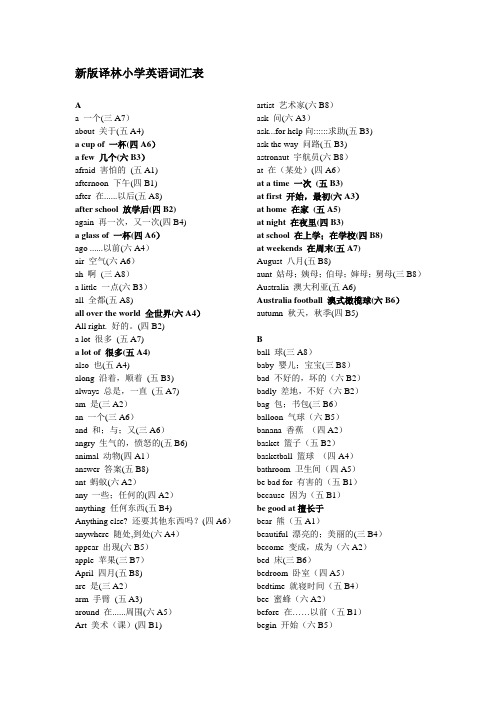
新版译林小学英语词汇表Aa 一个(三A7)about 关于(五A4)a cup of 一杯(四A6)a few 几个(六B3)afraid 害怕的(五A1)afternoon 下午(四B1)after 在......以后(五A8)after school 放学后(四B2)again 再一次,又一次(四B4)a glass of 一杯(四A6)ago ......以前(六A4)air 空气(六A6)ah 啊(三A8)a little 一点(六B3)all 全都(五A8)all over the world 全世界(六A4)All right. 好的。
(四B2)a lot 很多(五A7)a lot of 很多(五A4)also 也(五A4)along 沿着,顺着(五B3)always 总是,一直(五A7)am 是(三A2)an 一个(三A6)and 和;与;又(三A6)angry 生气的,愤怒的(五B6)animal 动物(四A1)answer 答案(五B8)ant 蚂蚁(六A2)any 一些;任何的(四A2)anything 任何东西(五B4)Anything else? 还要其他东西吗?(四A6)anywhere 随处,到处(六A4)appear 出现(六B5)apple 苹果(三B7)April 四月(五B8)are 是(三A2)arm 手臂(五A3)around 在......周围(六A5)Art 美术(课)(四B1) artist 艺术家(六B8)ask 问(六A3)ask...for help向::::::求助(五B3)ask the way 问路(五B3)astronaut 宇航员(六B8)at 在(某处)(四A6)at a time 一次(五B3)at first 开始,最初(六A3)at home 在家(五A5)at night 在夜里(四B3)at school 在上学;在学校(四B8)at weekends 在周末(五A7)August 八月(五B8)aunt 姑母;姨母;伯母;婶母;舅母(三B8)Australia 澳大利亚(五A6)Australia football 澳式橄榄球(六B6)autumn 秋天,秋季(四B5)Bball 球(三A8)baby 婴儿;宝宝(三B8)bad 不好的,坏的(六B2)badly 差地,不好(六B2)bag 包;书包(三B6)balloon 气球(六B5)banana 香蕉(四A2)basket 篮子(五B2)basketball 篮球(四A4)bathroom 卫生间(四A5)be bad for 有害的(五B1)because 因为(五B1)be good at擅长于bear 熊(五A1)beautiful 漂亮的;美丽的(三B4)become 变成,成为(六A2)bed 床(三B6)bedroom 卧室(四A5)bedtime 就寝时间(五B4)bee 蜜蜂(六A2)before 在……以前(五B1)begin 开始(六B5)behind 在......后面(三B4)beside在......旁边(五A1)between在......中间(五A1)big 大的(四A6)Big Ben (伦敦)大本钟(六B6)bike 自行车(五B2)bin 垃圾桶(六A6)bird 鸟(三B4)birthday 生日(五B8)bite 咬(六B1)black黑色的(三A6)blackboard 黑板(三B1)blue蓝色的(三A6)boat 小船(四A4)body 身体(五A3)book 书(三B1)bookshop 书店(五B3)both 两个都(五A4)bottle 瓶子((六A3)box 盒子(四A3)boy 男孩(三B8)brave 勇敢的(六B8)3.bread 面包(五B6)breakfast 早餐;早饭(三B6)bring 带来(六A2)brother哥哥;弟弟(三A4)brown棕色的(三A6)brush one’s teeth 刷牙(五B4)Bund 上海(外滩)(六A3)bus 公共汽车,巴士(五B2)busy 忙,忙碌(五B5)but 但是(四A3)buy 买(五A8)by在......旁边(五A6)by... 乘(汽车、火车等)(五B2)Ccake蛋糕;糕饼(三A7)call 叫作,称作(五B7)打电话(六A3)can 可以;能;会(四A3)Can I help you? (四A6)Canada 加拿大(五A6)cap便帽;帽子(三A5)car小汽车(三A8)card 卡片(五A8)care about 关心,在乎(六B8)careful 小心,当心(六A5)cat (四A1)catch 抓,抓住(五B6)CD光盘(三A8)chair 椅子(三B4)chat 聊天(五A7)check 检查(五B4)cheer 欢呼(六B1)chicken 鸡(三B7)child 孩子(六A1)children 孩子,儿童(五A8)Children’s Day 儿童节(六B5)China 中国((五A6)Chinese 语文(课)(四B1)Chinese New Year 中国农历新年(五B7)Chinese New Year’s Day 大年初一,春节(六A8)Chinese New Year’s Eve 大年夜,除夕(六A8)Christmas 圣诞节((五A8)Christmas Day圣诞节(五A8)Christmas Eve 圣诞夜,平安夜(五A8) Christmas tree 圣诞树(五A8)cinema 电影院(五B3)city 城市(五B2)class(1)同学们(三A1)(2)课;上课(三B6)classroom 教室(五A2)clean 擦,洗(五B2)干净的,整洁的(六A6)clever 聪明的(六A1)climb up 爬上(六A2)clock (四A5)close 关上;合上(三B1)clothes 衣服(五B1)cloud 云(六A2)cloudy 多云的(六A2)clown 小丑(六B5)coal 煤炭(六A7)coat 外衣,外套(四B6)coffee 咖啡(四A6)cola 可乐(六B3)cold 冷的,寒冷的;感冒(四B5,8)colour 颜色(三A6)come (四A5)come from 从……来,来自(六A7)come in 进来(三B1)come out 出来(五A7)come to school 来学校(四B8)come true 实现,成真(六B8)computer 电脑((五A2)cook 厨师(五A5)烧,煮(五B5)cool 酷,真棒(四A2)凉爽的,凉快的(四B5)cough 咳嗽(四B8)cousin 堂兄(弟);堂姐(妹);表兄(弟);表姐(妹)(三B8)country 国家((六B6)cow 奶牛(三B7)crayon 蜡笔(三B3)cross 穿过,穿行(六B4)cut down 砍伐,砍掉(六A7)cute 可爱的(四A1)DDad 爸爸(四A6)dance 跳舞(五A4)dancer 舞蹈家(六B8)Danger!危险!(六A5)day 天(四B2)dead 死的(六A6)dear 亲爱的(四B7)December 十二月(五B8)deep 深的(六B1)dentist 牙医(五B4)desk 课桌;书桌(三B4)diet 饮食(六B3)different 不同的(六B7)difficult 难的,困难的((四B4)dinner 晚餐;晚饭(三B6)dirty 肮脏的(六A6)Disneyland 迪士尼乐园(六B7)do shopping 购物(六A4)do 做;干(四A3)doctor 医生(五A5)dog 狗(四A1)doll玩具娃Don’t worry. 别担心。
新译林版小学3-6年级英语词汇
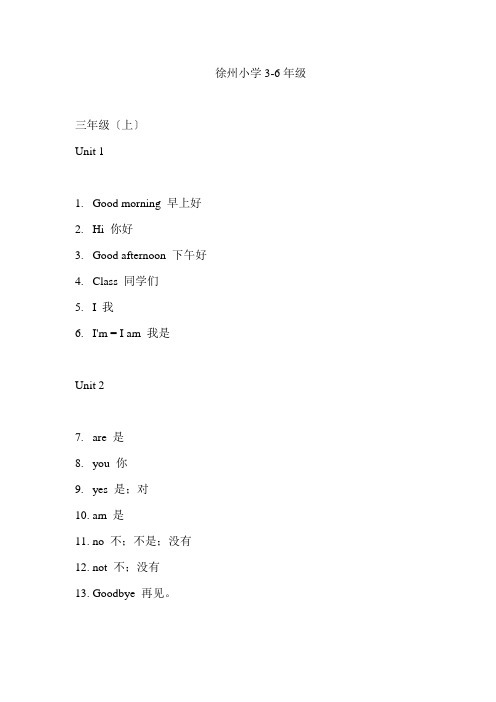
徐州小学3-6年级三年级〔上〕Unit 11.Good morning 早上好2.Hi 你好3.Good afternoon 下午好4.Class 同学们5.I 我6.I'm = I am 我是Unit 27.are 是8.you 你9.yes 是;对10.am 是11.no 不;不是;没有12.not 不;没有13.Goodbye 再见。
Unit 314.My 我的15.friend 朋友16.she 她17.she's=she is18.he 他19.he's=he is 他是20.too 也21.this 这;这个22.is 是23.sister 姐姐;妹妹Unit 424.family 家;家庭25.father 父亲;爸爸26.mother 母亲;妈妈27.brother 哥哥;弟弟28.me 我29.grandpa 祖父;外祖父30.grandma 祖母;外祖母31.Good evening. 晚上好。
Unit 532.look at 看;瞧33.T-shirt T恤衫34.it 它35.it's=it is36.nice 好看的;好的37.skirt 裙子38.How nice! 真好看!39.cap 便帽;帽子40.great 好极了;很好41.jacket 夹克衫42.new 新的43.What colour …? ……是什么颜色的?44.red 红色的Unit 645.colour 颜色46.orange 橙色的47.now 现在;目前48.green 绿色的49.and 和;与;又50.yellow 黄色的51.black 黑色的52.blue 蓝色的53.brown 棕色的54.white 白色的55.Would you like …? 你想要……吗?56.an 一个57.egg 蛋;鸡蛋58.Yes, please. 好的,太感谢了。
59.or 或;还是Unit 760.a 一个61.pie 馅饼;派.62.Nice to meet you. 很高兴认识你。
(完整版)译林版小学英语单词表
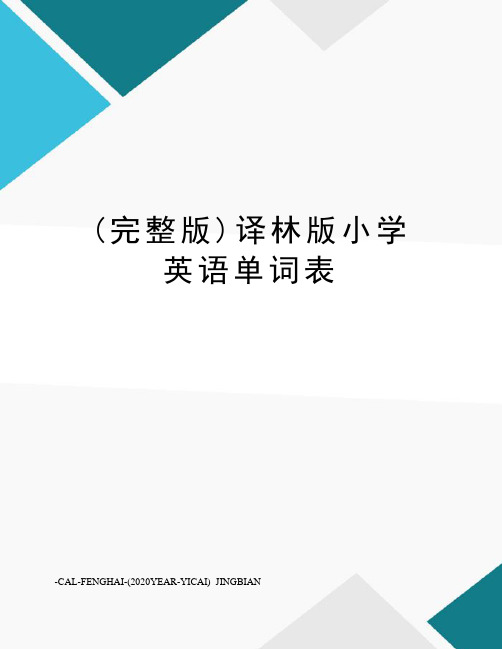
(完整版)译林版小学英语单词表-CAL-FENGHAI-(2020YEAR-YICAI)_JINGBIAN新版译林小学英语词汇表A a 一个(三A7) about 关于(五A4) a cup of 一杯(四A6) a few 几个(六B3) afraid 害怕的 (五A1) afternoon 下午(四B1) after 在......以后(五A8) after school 放学后(四B2) again 再一次,又一次(四B4) a glass of 一杯(四A6) ago ......以前(六A4) air 空气(六A6) ah 啊 (三A8) a little 一点(六B3) all 全都(五A8) all over the world 全世界(六A4) All right. 好的。
(四B2) a lot 很多 (五A7) a lot of 很多(五A4) also 也(五A4)along 沿着,顺着 (五B3) always 总是,一直 (五A7) am 是(三A2) an 一个(三A6) and 和;与;又(三A6) angry 生气的,愤怒的(五B6) animal 动物(四A1) answer 答案(五B8) ant 蚂蚁(六A2) any 一些;任何的(四A2) anything 任何东西(五B4) Anything else 还要其他东西吗(四A6) anywhere 随处,到处(六A4) appear 出现(六B5) apple 苹果(三B7) April 四月(五B8) are 是(三A2) arm 手臂 (五A3) around 在......周围(六A5) Art 美术(课)(四B1)artist 艺术家(六B8) ask 问(六A3) ask...for help 向::::::求助(五B3) ask the way 问路(五B3) astronaut 宇航员(六B8) at 在(某处)(四A6) at a time 一次 (五B3) at first 开始,最初(六A3) at home 在家 (五A5) at night 在夜里(四B3) at school 在上学;在学校(四B8) at weekends 在周末(五A7) August 八月(五B8) aunt 姑母;姨母;伯母;婶母;舅母(三B8) Australia 澳大利亚(五A6) Australia football 澳式橄榄球(六B6) autumn 秋天,秋季(四B5)B ball 球(三A8) baby 婴儿;宝宝(三B8) bad 不好的,坏的(六B2) badly 差地,不好(六B2) bag 包;书包(三B6) balloon 气球(六B5) banana 香蕉 (四A2) basket 篮子(五B2) basketball 篮球 (四A4) bathroom 卫生间(四A5) be bad for 有害的(五B1) because 因为(五B1) be good at 擅长于 bear 熊(五A1) beautiful 漂亮的;美丽的(三B4) become 变成,成为(六A2) bed 床(三B6) bedroom 卧室(四A5) bedtime 就寝时间(五B4) bee 蜜蜂(六A2)before 在……以前(五B1)begin 开始(六B5)behind 在......后面(三B4)beside在......旁边(五A1)between在......中间(五A1)big 大的(四A6)Big Ben (伦敦)大本钟(六B6)bike 自行车(五B2)bin 垃圾桶(六A6)bird 鸟(三B4)birthday 生日(五B8)bite 咬(六B1)black黑色的(三A6)blackboard 黑板(三B1)blue蓝色的(三A6)boat 小船(四A4)body 身体(五A3)book 书(三B1)bookshop 书店(五B3)both 两个都(五A4)bottle 瓶子((六A3)box 盒子(四A3)boy 男孩(三B8)brave 勇敢的(六B8)3.bread 面包(五B6)breakfast 早餐;早饭(三B6)bring 带来(六A2)brother哥哥;弟弟(三A4)brown棕色的(三A6)brush one’s teeth 刷牙(五B4)Bund 上海(外滩)(六A3)bus 公共汽车,巴士(五B2)busy 忙,忙碌(五B5)but 但是(四A3)buy 买(五A8)by在......旁边(五A6)by... 乘(汽车、火车等)(五B2)Ccake蛋糕;糕饼(三A7)call 叫作,称作(五B7)打电话(六A3)can 可以;能;会(四A3)Can I help you? (四A6)Canada 加拿大(五A6)cap便帽;帽子(三A5)car小汽车(三A8)card 卡片(五A8)care about 关心,在乎(六B8)careful 小心,当心(六A5)cat (四A1)catch 抓,抓住(五B6)CD光盘(三A8)chair 椅子 (三B4)chat 聊天(五A7)check 检查(五B4)cheer 欢呼(六B1)chicken 鸡(三B7)child 孩子(六A1)children 孩子,儿童(五A8) Children’s Day 儿童节(六B5)China 中国((五A6)Chinese 语文(课)(四B1)Chinese New Year 中国农历新年(五B7)Chinese New Year’s Day 大年初一,春节(六A8)Chinese New Year’s Eve 大年夜,除夕(六A8)Christmas 圣诞节((五A8) Christmas Day圣诞节(五A8) Christmas Eve 圣诞夜,平安夜(五A8) Christmas tree 圣诞树(五A8) cinema 电影院(五B3)city 城市(五B2)class(1)同学们(三A1)(2)课;上课(三B6)classroom 教室 (五A2)clean 擦,洗(五B2)干净的,整洁的(六A6)clever 聪明的(六A1)climb up 爬上(六A2)clock (四A5)close 关上;合上(三B1)clothes 衣服(五B1)cloud 云(六A2)cloudy 多云的(六A2)clown 小丑(六B5)coal 煤炭(六A7)coat 外衣,外套(四B6)coffee 咖啡(四A6)cola 可乐(六B3)cold 冷的,寒冷的;感冒(四B5,8)colour 颜色(三A6)come (四A5)come from 从……来,来自(六A7)come in 进来(三B1)come out 出来(五A7)come to school 来学校(四B8)come true 实现,成真(六B8)computer 电脑((五A2)cook 厨师(五A5)烧,煮(五B5)cool 酷,真棒(四A2)凉爽的,凉快的(四B5)cough 咳嗽(四B8)cousin 堂兄(弟);堂姐(妹);表兄(弟);表姐(妹)(三B8)country 国家((六B6)cow 奶牛(三B7)crayon 蜡笔(三B3)cross 穿过,穿行(六B4)cut down 砍伐,砍掉(六A7)cute 可爱的(四A1)DDad 爸爸(四A6)dance 跳舞(五A4)dancer 舞蹈家(六B8)Danger!危险!(六A5)day 天(四B2)dead 死的(六A6)dear 亲爱的(四B7)December 十二月(五B8)deep 深的(六B1)dentist 牙医(五B4)desk 课桌;书桌(三B4)diet 饮食(六B3)different 不同的(六B7)difficult 难的,困难的((四B4)dinner 晚餐;晚饭 (三B6)dirty 肮脏的(六A6)Disneyland 迪士尼乐园(六B7)do shopping 购物(六A4)do 做;干(四A3)doctor 医生(五A5)dog 狗(四A1)doll玩具娃Don’t worry. 别担心。
小学英语译林版单词表三四五六年级词汇表上下册单词表(带音标按单元顺序)(三年级至六年级全8册
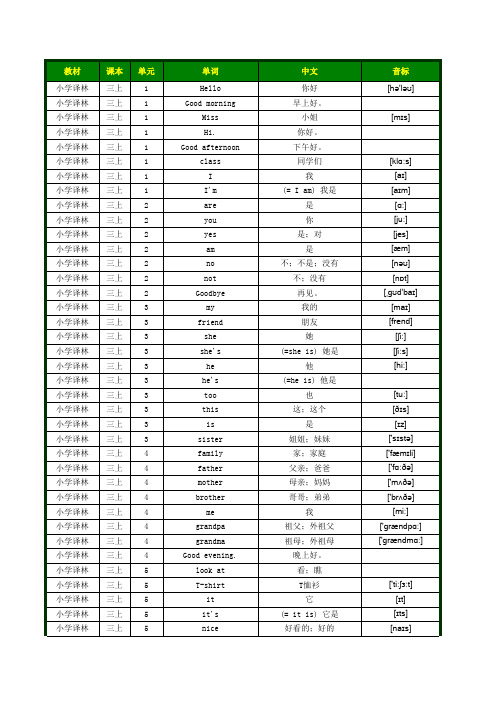
blue
蓝色的
小学译林 三上 6
brown
棕色的
小学译林 三上 6
white
白色的
小学译林 三上
6
Would you like ...?
你想要......吗?
小学译林 三上 6
an
一个
小学译林 三上 6
Yes,please.
好的;太感谢了.。
小学译林 三上 6
or
或;还是
小学译林 三上 7
a
一个
小学译林 三上 7
音标 [hə'ləʊ]
[mɪs]
[klɑːs] [aɪ] [aɪm] [ɑː] [juː] [jes] [æm] [nəʊ] [nɒt]
[ˌgʊd'baɪ] [maɪ] [frend] [ʃiː] [ʃiːs] [hiː]
[tuː] [ðɪs] [ɪz] ['sɪstə] ['fæmɪli] ['fɑːðə] ['mʌðə] ['brʌðə] [miː] ['grændpɑː] ['grændmɑː]
……是什么颜色的?
小学译林 三上
5
red
红色的
小学译林 三上
6
colour
颜色
小学译林 三上
6
orange
橙色的
小学译林 三上
6
now
现在;目前
小学译林 三上 6
green
绿色的
小学译林 三上 6
and
和;与;又
小学译林 三上 6
yellow
黄色的
小学译林 三上 6
black
黑色的
小学译林 三上 6
小学英语译林版单词表三到六年级上下册词汇表单词表(带音标按单元或字母顺序)(三年级至六年级全8册)

['tʃaɪnə] ['tʃaɪ'niːz]
['krɪsməs]
[ˈsɪnəmə] ['sɪti] [klɑːs] [klɑːs]
['klɑːsrʊm] [kliːn] [kliːn] ['klevə]
[klɒk] [kləʊz] [kləʊðz] [klaʊd] ['klaʊdi]
课本
五上 六上 四下 六下 六下 五下 五下 六下 四上 六下 六上 五上 四下 四下 五上 五下 三下 五上 六下 四下 三下 六下 三下 三上 六下 四上 五下 四上 四上 五下 五上 五上 三下 五下 六上 三下 四上 五下 六上 五下
单元
3 5 1 8 1 3 3 8 6 3 3 5 3 8 7 8 8 6 6 5 8 2 6 8 5 2 2 4 5 1 4 1 4 1 2 6 5 4 2 1
单词
can't cap car card
care about careful cat catch CD chair chat check cheer chicken child children
Children's Day China
Chinese Chinese New Year Chinese New Year's Day Chinese New Year's Eve
音标 [bɪ'gɪn] [bɪ'haɪnd] [bɪ'saɪd] [bɪ'twiːn]
[bɪg] [ben] [baɪk] [bɪn] [bɜːd] ['bɜːθdeɪ] [baɪt] [blæk] ['blækbɔːd] [bluː] [bəʊt] [ˈbɒdi] [bʊk] [ˈbʊkʃɒp] [bəʊθ] [ˈbɒtl] [bɒks] [bɔɪ] [bred] ['brekfəst] ['brʌðə] [braʊn]
江苏译林版小学英语单词汇总表-带音标可打印
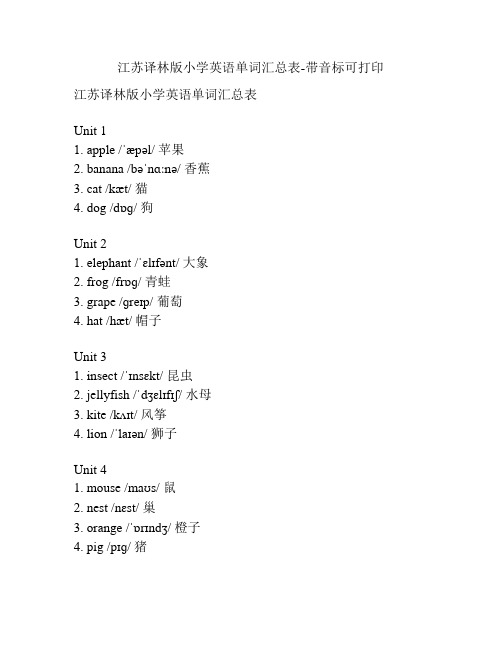
江苏译林版小学英语单词汇总表-带音标可打印江苏译林版小学英语单词汇总表Unit 11. apple /ˈæpəl/ 苹果2. banana /bəˈnɑːnə/ 香蕉3. cat /kæt/ 猫4. dog /dɒɡ/ 狗Unit 21. elephant /ˈɛlɪfənt/ 大象2. frog /frɒɡ/ 青蛙3. grape /ɡreɪp/ 葡萄4. hat /hæt/ 帽子Unit 31. insect /ˈɪnsɛkt/ 昆虫2. jellyfish /ˈdʒɛlɪfɪʃ/ 水母3. kite /kʌɪt/ 风筝4. lion /ˈlaɪən/ 狮子Unit 41. mouse /maʊs/ 鼠2. nest /nɛst/ 巢3. orange /ˈɒrɪndʒ/ 橙子4. pig /pɪɡ/ 猪Unit 51. queen /kwiːn/ 女王2. rabbit /ˈræbɪt/ 兔子3. sun /sʌn/ 太阳4. tiger /ˈtaɪɡər/ 老虎Unit 61. uncle /ˈʌŋkəl/ 叔叔2. vi olin /ˌvaɪəˈlɪn/ 小提琴3. watch /wɒtʃ/ 手表4. xylophone /ˈzaɪləfoʊn/ 木琴Unit 71. yellow /ˈjɛloʊ/ 黄色的2. zebra /ˈziːbrə/ 斑马3. book /bʊk/ 书4. baby /ˈbeɪbi/ 婴儿Unit 81. ball /bɔːl/ 球2. carrot /ˈkærət/ 胡萝卜3. desk /dɛsk/ 书桌4. egg /ɛɡ/ 鸡蛋Unit 91. flower /ˈflaʊər/ 花2. girl /ɡɜːrl/ 女孩3. helmet /ˈhɛlmɪt/ 头盔4. ice cream /aɪs krim/ 冰淇淋Unit 101. juice /dʒus/ 果汁2. kangaroo /ˌkæŋɡəˈruː/ 袋鼠3. lemon /ˈlɛmən/ 柠檬4. monkey /ˈmʌŋki/ 猴子以上是江苏译林版小学英语单词汇总表。
译林牛津版四年级下册英语 U4 Drawing in the park 知识点

译林版(三起)四年级英语下册知识点归纳
Unit 4 Drawing in the park
Part one
Story time+Grammar+Fun time
单词:
词汇:
语法:
课文中:This is the tree
These are the flowers.
定冠词the
the的含义:这个、那个、这些、那些
所以:the 既可以指代单数,也可以指代复数
既可以指代远处的事物,又可以指代近处的事物
课文中:the tree the flowers
思考:为什么课文中是This is the tree.而不是This is a tree 呢?
是These are the trees.而不是These are trees.呢?
解析:
the 这里是用来“特指”他们双方都知道的“那一棵树”和“那一些花”
a是泛指,如果用a tree则不知道指的是公园里的哪一颗树
复数flowers前面不加the的时候,也是泛指,不知道画的是公园里的哪一些花
Part two
Cartoon time
单词
again
a+g+ai+n
ai的发a的字母音
再一次,又一次
短语
语法
Part three Sound time+Song time
字母e的发音
语法。
精品译林版四年级英语下册Unit 6 Whose dress is this重点语法、 基础知识整理

四年级英语(下册)重点语法、基础知识4B Unit 6 Whose dress is this ?Words:1.dress /dres/ (名词)连衣裙→复数:dress es复习:以x s sh ch 以及部分有生命的o结尾单词复数加es短语:a red dress 一件红色的短裙dress up 装扮;打扮例句:看我的连衣裙。
Look _____ _______ ______ .你的连衣裙很漂亮。
Your ______ is _______ .2.too /tu:/ 太;过于→同音词:two 二/ to 到……解析:too 表示“太,过于”时,放在形容词之前;表示“也”时,放在句末。
例句:你的连衣裙太长了。
Your ______ is _______ long .今天天气太热了。
It’s ______ ______ today .你的裙子太小了。
Your skirt is _______ ________ .我也喜欢夏天。
I like _______ _______ .3.trousers (名词)裤子(长裤)trousers 是成双成对出现的服饰,通常用复数形式表示。
短语:一条裤子a pair of trousers 两条裤子two pairs of trousers例句:—看我的裤子。
—他们太瘦了。
—Look at my trousers . —They are too thin . 4.party /pa:ti/ (名词) 聚会→复数:parties (以辅音+y结尾单词的复数,变y为ies)短语:举行聚会have a party 去参加聚会go to a party例句:party , fun , very , is , the , (.) 连词成句_________________________________5.glove (名词)手套→复数:gloves短语:一副手套a pair of gloves 三副手套three pairs of gloves例句:—他们是你的手套吗?—是的。
译林版英语四年级下册Unit 1词汇详解课件(29页)
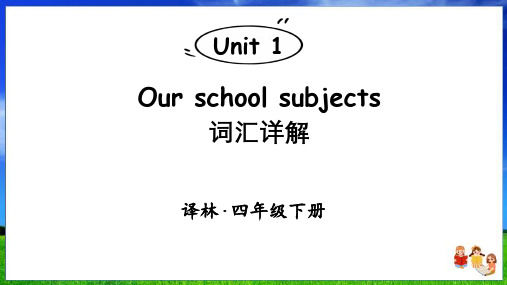
我们星期一有什么课?
注意
Monday 的首字母无论何时都要大写。
n.(名词) 下午
短语
in the afternoon 在下午
例句
I go home at five in the afternoon.
我下午五点回家。
巧记
after(在……之后) afternoon(下午)
noon(中午)
联想
morning 早晨;上午 evening 晚上
n.(名词) 语文(课)
例句
We have Chinese everyday.
我们每天都有语文课。
其他词义
中文;中国人
拓展
Chinese (形容词)中国的;中国人的
联想
China 中国
n.(名词) 数学(课)
短语
have Maths 上数学课
例句
They have Maths in the morning.
n.(名词) 科学(课)
短语
a Science lesson 一节科学课
have Science 上科学课
例句
Let's have Science now.
让我们现在上科学课吧。
形近词 例句 拓展 巧记
n.(名词) 乐趣,快乐
fan 扇子 短语
have fun 玩得开心
I like basketball. It‘s fun. 我喜欢篮球。它很有趣。
我们有七门课程。
联想
Chinese 语文(课) Maths 数学(课)
English 英语(课) Art 美术(课)
Music 音乐(课) PE 体育(课)
Science 科学(课)
(完整版)译林版英语词汇表(四年级下)
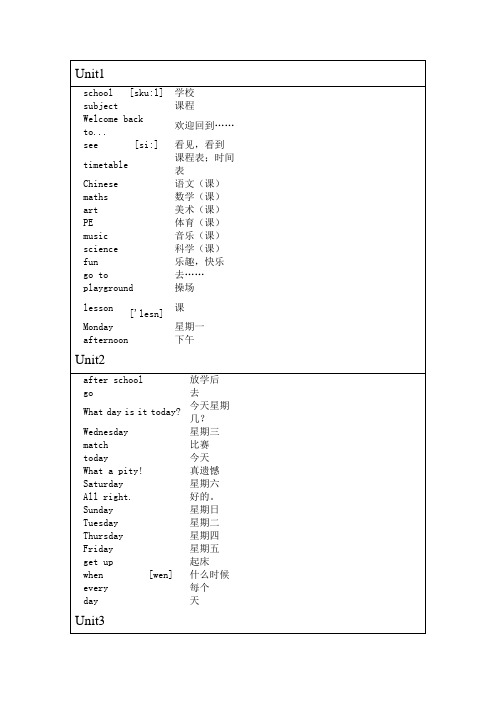
school
[sku:l]
学校
subject
课程
Welcome back to...
欢迎回到……
see
[si:]
看见,看到
timetable
课程表;时间表
Chinese
语文(课)
maths数学(Leabharlann )art美术(课)
PE
体育(课)
music
音乐(课)
science
科学(课)
fun
乐趣,快乐
go to
去……
playground
操场
lesson
['lesn]
课
Monday
星期一
afternoon
下午
Unit2
after school
放学后
go
去
What day is it today?
今天星期几?
Wednesday
星期三
match
比赛
today
今天
What a pity!
真遗憾
Saturday
星期六
在下午
play football
踢足球
go home
回家
homework
家庭作业
have dinner
吃晚饭
watch TV
看电视
go to bed
睡觉
in the evening
在晚上
at night
在夜里
Unit4
drawing
画画
park
公园
draw
画
Good ideal!
好主意!
flower
译林版四年级下册英语Unit 2 After school知识梳理

译林版四年级下册英语Unit 2 After school知识梳理Unit 2 After school一、语音:字母a的读音/æ / bag cap hamburger sandwich snack二、单词:1. Monday 星期一2. Tuesday 星期二3. Wednesday 星期三4. Thursday 星期四5. Friday 星期五6. Saturday 星期六7. Sunday 星期天 8. get up 起床9. day 天,日子10. go 去11. match 比赛11. today 今天12. when 什么时候13. every 每个三、词组:1. get up 起床2. on Saturday 在周六3. at five 在五点钟4. every day 每天5. have a swimming lesson 上一节游泳课6. what day 星期几7. have a football match举行一场足球比赛8. good morning 上午好9. come and play table tennis 来打乒乓球 10. after school 放学后11. on Thursday afternoon 在周四下午12. on Tuesday morning 在周二上午四、句型:1. I have a football match. 我有一场足球比赛。
2. He has a swimming lesson. 他有一节游泳课。
3. She has a skating lesson. 她有一节溜冰课。
4. We don’t have any lessons on Saturday. 我们星期六没有课。
5. What day is it today? 今天星期几?6. It’s Thursday. 今天星期二。
7. What a pity! 真遗憾啊!8. What about Saturday? 星期六怎么样?9. All right. 好的。
译林版四年级英语下册Unit1-8全册知识点汇总
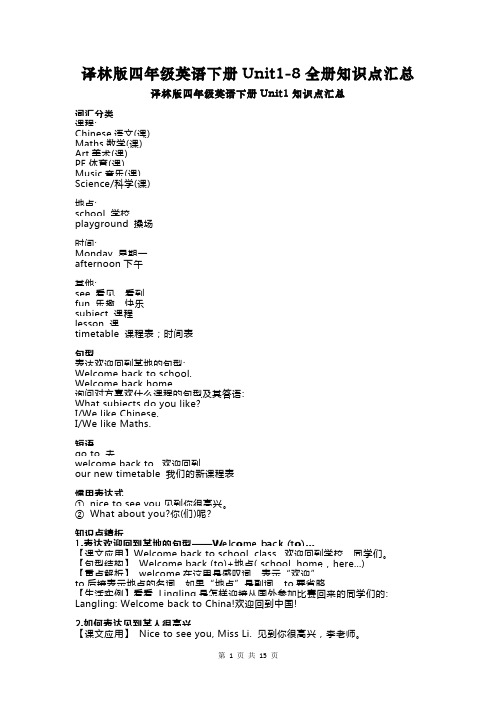
译林版四年级英语下册Unit1-8全册知识点汇总译林版四年级英语下册Unit1知识点汇总词汇分类课程:Chinese语文(课)Maths数学(课)Art美术(课)PE体育(课)Music音乐(课)Science/科学(课)地点:school 学校playground 操场时间:Monday 星期一afternoon下午其他:see 看见,看到fun 乐趣,快乐subject 课程lesson 课timetable 课程表;时间表句型表达欢迎回到某地的句型:Welcome back to school.Welcome back home.询问对方喜欢什么课程的句型及其答语:What subjects do you like?I/We like Chinese.I/We like Maths.短语go to 去…welcome back to…欢迎回到…our new timetable 我们的新课程表惯用表达式①nice to see you.见到你很高兴。
②What about you?你(们)呢?知识点精析1.表达欢迎回到某地的句型——Welcome back (to)…【课文应用】Welcome back to school, class. 欢迎回到学校,同学们。
【句型结构】Welcome back (to)+地点( school, home,here...)【重点解析】welcome在这里是感叹词,表示“欢迎”to后接表示地点的名词,如果“地点”是副词,to要省略。
【生活实例】看看Lingling是怎样迎接从国外参加比赛回来的同学们的: Langling: Welcome back to China!欢迎回到中国!2.如何表达见到某人很高兴【课文应用】Nice to see you, Miss Li. 见到你很高兴,李老师。
Nice to see you too. 见到你们也很高兴。
“Nice to see you”意为“见到你(们)很高兴”,它的答语可以为“Nice to see you too.例如:一Nice to see you here,Miss Zhao. 在这里见到你很高兴,赵老师。
- 1、下载文档前请自行甄别文档内容的完整性,平台不提供额外的编辑、内容补充、找答案等附加服务。
- 2、"仅部分预览"的文档,不可在线预览部分如存在完整性等问题,可反馈申请退款(可完整预览的文档不适用该条件!)。
- 3、如文档侵犯您的权益,请联系客服反馈,我们会尽快为您处理(人工客服工作时间:9:00-18:30)。
them
他们;她们;它们
easy
容易的,简单的
boat
小船
river
河;江
difficult
难的,困难的
try
试
hill
小山,山丘
lake
湖,湖泊
again
再一次,又一次
Uni5
season
季节
spring
春天,春季
warm
温暖的,温和的
fly
放(风筝、飞机模型等)
kite
风筝
go boating
Unit6
dress
[dres]
连衣裙
too
[tu:]
太,过于
trousers
裤子
party
聚会,派对
glove
手套
so
如此,这么
coat
外衣,外套
shirt
(男式)衬衫
sweater
毛衣;绒衣
jeans
牛仔裤
shorts
短裤
wrong
错的,错误的
move
[mu:v]
移动
I thingk so.
我想是。
Unit1
school
[sku:l]
学校
subject
课程
Welcome back to...
欢迎回到……
see
[si:]
看见,看到
timetable
课程表;时间表
Chinese
语文(课)
maths
数学(课)
art
美术(课)
PE
体育(课)
music
音乐(课)
science
科学(课)
fun
乐趣,快乐
go to
来学校
cold
感冒
fever
发烧
hear
听到,听见
take care
保重
I'm fine,thank you.
我很好,谢谢。
See you tomorrow.
明天见。
See you.
再见。
cough
咳嗽
headache
头疼,头痛
Not so good.
不太好。
at school
在上学;在学校
去……
playground
操场
lesson
['lesn]
课
Monday
星期一
afternoon
下午
Unit2
after school
放学后
go
去
What day is it today?
今天星期几?
Wednesday
星期三
match
比赛
today
今天
What a pity!
真遗憾
Saturday
星期六
All right.
好的。
Sunday
星期日
Tuesday
星期二
Thursday
星期四
Friday
星期五
get up
起床
when
[wen]
什么时候
every
每个
day
天
Unit3
usually
通常,常常
go to school
上学
in the morning
在上午
have lunch
吃午饭
in the afternoon
去划船
summer
夏天,夏季
hot
热的,炎热的
go swimming
去游泳
autumn
秋天,秋季
cool
[ku:l]
凉爽的,凉快的
picnic
野餐
go climbing
去爬山Hale Waihona Puke winter冬天,冬季
cold
冷的,寒冷的
go skating
去溜冰;去滑冰
fine
晴朗的
hey
嘿,喂
whose
[hu:z]
谁的
在下午
play football
踢足球
go home
回家
homework
家庭作业
have dinner
吃晚饭
watch TV
看电视
go to bed
睡觉
in the evening
在晚上
at night
在夜里
Unit4
drawing
画画
park
公园
draw
画
Good ideal!
好主意!
flower
What's the matter?
怎么了?
hand
手
hurt
感到疼痛
Unit7
thirsty
渴的,口渴的
water
水
ill
生病的
tired
累的,疲劳的
Good night.
晚安。
dear
亲爱的
happy
快乐的,高兴的
Mrs
夫人,太太
speak
[spi:k]
说话,讲话
Unit8
May
可以
come to school
